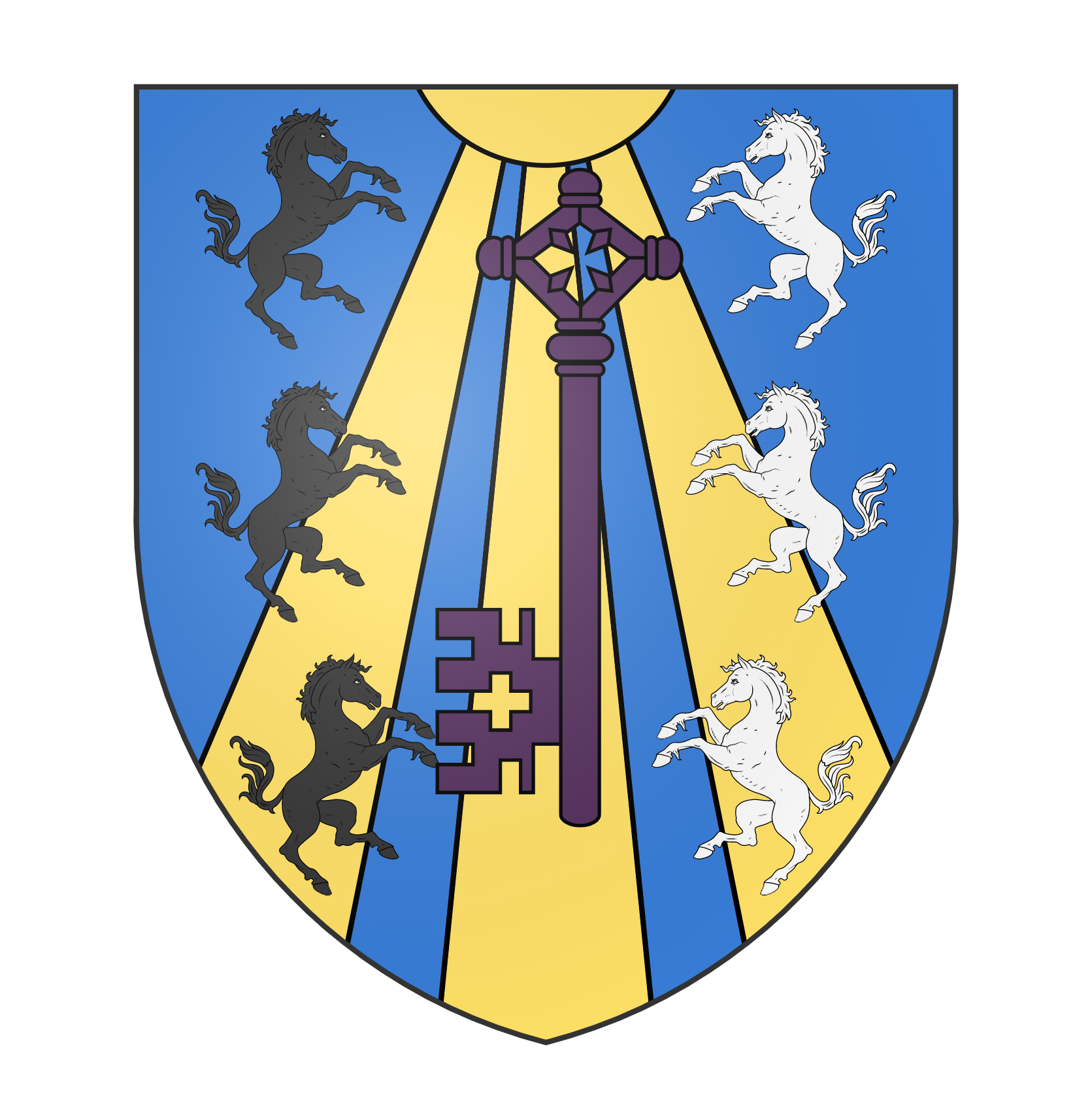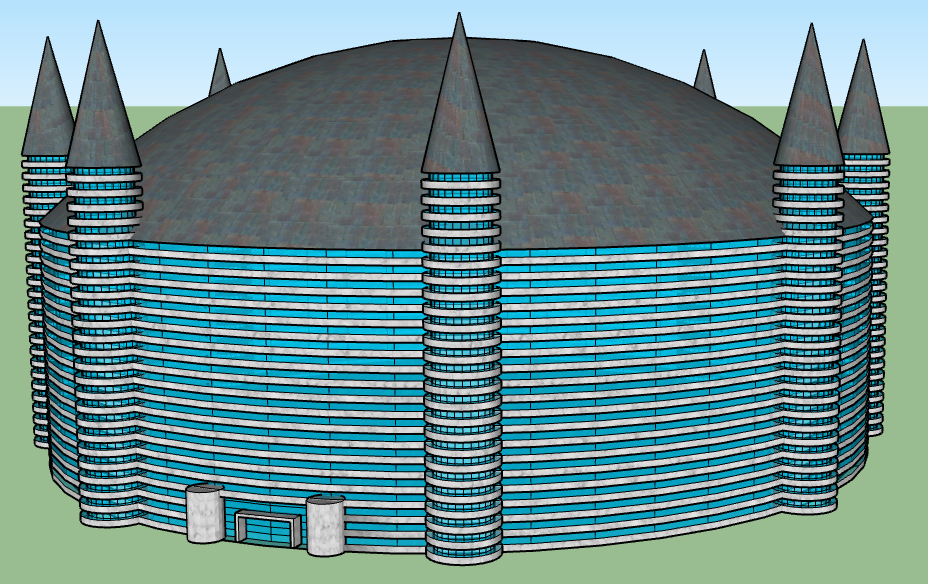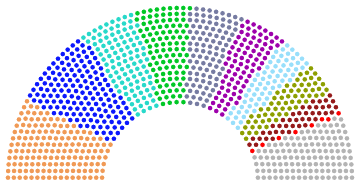Alliance Senate
The Alliance Senate is the highest law making deliberative assembly in the Northup Alliance, and is responsible for electing the Alliance President, authorising Presidential actions, and the creation and passing of Alliance-wide laws. It also ratifies the President's selection for the heads of executive agencies and members of the Alliance High Court, but this is largely seen as ceremonial.
Although new Senate seats should be created as the borders of the Alliance expands, and new star systems are colonised, in practice no new seats have been created in almost fifty years, stalling the number of seats in the Senate to an even one thousand. Each seat represents a differing number of worlds, from a few hundred in the oldest seats, to several thousand in the newest. This has led to accusations that the older seats wield far greater power than the newer ones, which are growing increasingly unrepresentative of their population, however political motivation to increase the number of seats is low, as it would disrupt the status quo which has formed in the last century or so.
Although Senators are elected from a myriad number of localised political parties, ten distinct groups, known as 'Blocs' have emerged to allow members to pool their voices and ensure legislation can be passed. There are also a large number of independent Senators who belong to no established Bloc.
Structure
Each of the one thousand senatorial seats is filled by an election in each of the Sector Assemblies, by Assembly Members, to sit for a period of ten standard years, known as a Senate Session. Assuming they can retain the nomination and votes from their Assembly, Senators have no term limits, and can continue to sit for as long as they have the support from their Sector Assembly. Senatorial elections are held at around the same time, across the Alliance, unless death, injury or recall renders a seat empty, in which case a by-election can be held if the current Senate Session has more than 1 year remaining.
The Senate meets in the Alliance Senate building on Beta Canum Venaticorum, but the proceedings are broadcast as live as is possible across the Alliance for any citizen to watch. Citizens are also entitled to sit in the public gallery of the Senate Building to watch the proceedings, but are not allowed to interfere with Senate activities. Most Senators will spend some of their time meeting with constituents, but the sheer scale of the representation means that very few people ever meet their Senator.
Independents - The third largest group, if it were ever cohesive. Instead independent Senators are often courted by the various blocs to help support getting their policies enacted. Whilst an independent Senator may never have one of their own policies put forwards for a vote, they are free from bloc politics and can support their constituents without compromise.
Blocs
The Senate is arranged into ten Blocs, which Senators align themselves with for voting purposes. This arrangement is informal, not a part of the Alliance Constitution, and Senators are not legally bound to vote with the interests of their Bloc, although unfaithful Senators will find their support waning should they continually go against Bloc intentions. The actually proportions of the Senate vary with each election, but for the last several decades, the largest Blocs in the Senate have been the Freedom League and the Blue Alliance, with 30% of the seats between them, and the top four Blocs holding over 50% of the seats. The ebb and flow of support for the top two Blocs sees Alliance expansionist drives rise and fall through successive Senate Sessions. The 11 BlocsFreedom League - the oldest of all the blocs, trading its founding back to the establishment of the Alliance Senate over ten thousand years ago. The Freedom League is generally progressive in social policies, and supports a multi-cultural, secular authority, with a strong Alliance of largely autonomous systems, rather than a federalised state that pushes for continual expansion. Largely supported by the Alliance bureaucracy and courts, which prefer a more stable number of systems.
Blue Alliance - Only a few hundred years old, the Blue Alliance rose quickly in power and whilst it shares a lot of the socially liberal and secular politics of the Freedom League, but is much more nationalistic, preferring a strong central authority and an outward, expansionist goal. It also holds the opinion that Alliance systems should aim to homogenise as much as possible into democratic forms. Has strong support from the Alliance military.
Unity Coalition - Sitting broadly between the top two Blocs in wanting a strong, homogenous Alliance, but no desire for further expansion, it also wants to see the Alliance enforce democratic principles on its member systems, even though this would technically violate the Alliance constitution.
Green Group - Its most distinctive policy is of a moratorium on further terraforming, arguing that artificial habitats are far less invasive on natural processes. One of the most pacifistic of the Blocs as well as discouraging further expansion in exchange for conservationist efforts on existing systems.
Administration League - Often joked that it has no firm policies, this bloc aims to maintain the status quo, and strikes a balance between all of the major parties, urging moderation in all policies. Its success is largely due to it being a 'safe' bloc with which to cast one's lot, and is far less demanding that member Senators adhere to any specific voting criteria.
Future Coalition - An bloc of religiously minded Senators, with socially conservative views and a strong assimilationist and expansionist ideology. The loudest voice in the Senate for Anti-Xahian rhetoric, as well as demands for faster and more aggressive expansion, with new colonies meeting certain principles on founding.
Technology League - One of two technocratically minded blocs, but one that is focused on engineering principles and has a stated goal to reform the Senate into a body that oversees largely autonomous systems and their building of new megastructures.
Science Group - Similar to the Technology League, except with a focus on scientific research. Surprisingly socialist in its policies, it also wishes to see further expansion, but from a research and exploration perspective, as opposed to colonisation.
Labour Movement - A strong socialist bloc that aims to support the interests of the common workers of the Alliance. Has strong support from systems and Sectors with large mining and industrial capacities but often faced strong opposition from corporate states and interests.
Communist group - The smallest of all the blocs, but one that has existed, in one form or another since the foundation of the Alliance. Famous for its constant in-fighting, it has never manged to secure more than a dozen seats, but continues to survive thanks to strong social policies and a moderate view on everything but the economic system.

214 XC - Extant
Type
Governmental, Senate/Parliament
Alternative Names
The Senate
Demonym
Senators
Parent Organization
Location
Remove these ads. Join the Worldbuilders Guild




Comments